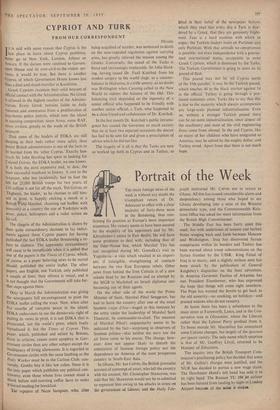Portrait of the Week
THE, main foreign news of the week is without any doubt the triumphant return of Dr. Adenauer to office with a clear majority of forty-three seats in the Bundestag, thus con- firming his position as Europe's most important statesman. His victory seems to have been assured by the stupidity of his opponents and by Mr. Khrushchev's antics in East Berlin. He will have some problems to deal with, including that of the Oder-Neisse line, which Marshal Tito has just recognised during Mr. Gomulka's visit to Yugoslavia—a visit which resulted in an import- ant, if intangible, strengthening of contacts between the two East European rebels. Other news from behind the Iron Curtain is of a new missile fired by the Russians and an attempt by the MGB to blackmail an Israeli diplomat into becoming one of their agents.
On the other side of the world the Prime Minister of Siam, Marshal Pibul Songgram, has had to leave the country after one of the usual Siamese coups d'etat—staged in this instance by the army under the leadership of Marshal Sarit Thanarat, its commander-in-chief. The measure of Marshal Pibul's , unpopularity seems to be indicated by the fact—surprising to observers of Siamese politics—that neither the navy nor the air force came to his rescue. The change, how- ever, does not appear likely to disturb the orientation of Siamese foreign policy nor the dependence on America of the most prosperous country in South-East Asia.
In Ghana, Mr. Ian Colvin, the British journalist accused of contempt of court, who left the country with his counsel, Mr. Christopher Shawcross, was told that Mr. Shawcross would not be re-admitted to represent him owing to his attacks in court on the government of Ghana; and the Daily Tele- graph instructed Mr. Colvin not to return to Ghana. All this has caused considerable alarm and despondency among those who hoped to see Ghana developing into a state of the Western democratic type, and the Commonwealth Rela- tions Office has asked for more information from the British High Commissioner.
The Middle East has been fairly quiet this week, but with undertones of tension and barbed Notes winging back and forth between Moscow and Washington. Iraq has discovered Syrian conspiracies within its borders and Turkey has been warned about troop concentrations on the Syrian frontier by the USSR. King Feisal of Iraq is to marry, and a slightly archaic note has been struck by the publication of General Keightley's dispatches on the Suez adventure. In America Governor Faubus of Arkansas has met President Eisenhower, who has expressed the hope that things will come right somehow. The Pope has warned the Jesuits to get back to the old austerity—no smoking, no holidays—and praised widows who do not remarry.
At home there has been a subsidence in the main street at Farnworth, Lanes, and in the Con- servative vote in Gloucester, where the Liberals rather than the Labour Party profited from it. To boost morale Mr. Macmillan has announced some Cabinet changes, but largely of the ignotuin per ignota variety. The only name which surprises is that of Mr. Geoffrey Lloyd, returned to be Minister of Education.
The inquiry into the British Transport Com- mission's purchasing policy has decided that some of Mr. Gethin's charges were justified, and the NUR has decided to pursue a new wage claim. The Dorchester Hotel's left hand has sold it to its right hand. The Russian TU 104 jet airliner has been banned from landing by night at London Airport because of the noise it makes.






























 Previous page
Previous page